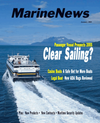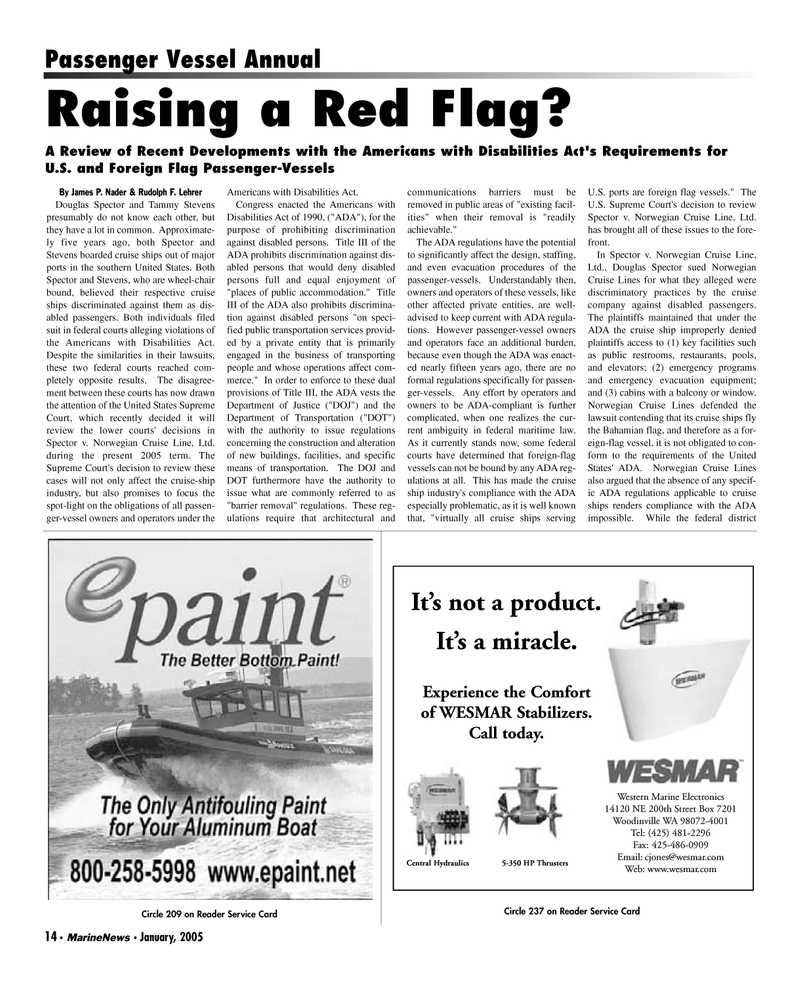
Page 14: of Marine News Magazine (January 2005)
Read this page in Pdf, Flash or Html5 edition of January 2005 Marine News Magazine
14 • MarineNews • January, 2005
Passenger Vessel Annual
By James P. Nader & Rudolph F. Lehrer
Douglas Spector and Tammy Stevens presumably do not know each other, but they have a lot in common. Approximate- ly five years ago, both Spector and
Stevens boarded cruise ships out of major ports in the southern United States. Both
Spector and Stevens, who are wheel-chair bound, believed their respective cruise ships discriminated against them as dis- abled passengers. Both individuals filed suit in federal courts alleging violations of the Americans with Disabilities Act.
Despite the similarities in their lawsuits, these two federal courts reached com- pletely opposite results. The disagree- ment between these courts has now drawn the attention of the United States Supreme
Court, which recently decided it will review the lower courts' decisions in
Spector v. Norwegian Cruise Line, Ltd. during the present 2005 term. The
Supreme Court's decision to review these cases will not only affect the cruise-ship industry, but also promises to focus the spot-light on the obligations of all passen- ger-vessel owners and operators under the
Americans with Disabilities Act.
Congress enacted the Americans with
Disabilities Act of 1990, ("ADA"), for the purpose of prohibiting discrimination against disabled persons. Title III of the
ADA prohibits discrimination against dis- abled persons that would deny disabled persons full and equal enjoyment of "places of public accommodation." Title
III of the ADA also prohibits discrimina- tion against disabled persons "on speci- fied public transportation services provid- ed by a private entity that is primarily engaged in the business of transporting people and whose operations affect com- merce." In order to enforce to these dual provisions of Title III, the ADA vests the
Department of Justice ("DOJ") and the
Department of Transportation ("DOT") with the authority to issue regulations concerning the construction and alteration of new buildings, facilities, and specific means of transportation. The DOJ and
DOT furthermore have the authority to issue what are commonly referred to as "barrier removal" regulations. These reg- ulations require that architectural and communications barriers must be removed in public areas of "existing facil- ities" when their removal is "readily achievable."
The ADA regulations have the potential to significantly affect the design, staffing, and even evacuation procedures of the passenger-vessels. Understandably then, owners and operators of these vessels, like other affected private entities, are well- advised to keep current with ADA regula- tions. However passenger-vessel owners and operators face an additional burden, because even though the ADA was enact- ed nearly fifteen years ago, there are no formal regulations specifically for passen- ger-vessels. Any effort by operators and owners to be ADA-compliant is further complicated, when one realizes the cur- rent ambiguity in federal maritime law.
As it currently stands now, some federal courts have determined that foreign-flag vessels can not be bound by any ADA reg- ulations at all. This has made the cruise ship industry's compliance with the ADA especially problematic, as it is well known that, "virtually all cruise ships serving
U.S. ports are foreign flag vessels." The
U.S. Supreme Court's decision to review
Spector v. Norwegian Cruise Line, Ltd. has brought all of these issues to the fore- front.
In Spector v. Norwegian Cruise Line,
Ltd., Douglas Spector sued Norwegian
Cruise Lines for what they alleged were discriminatory practices by the cruise company against disabled passengers.
The plaintiffs maintained that under the
ADA the cruise ship improperly denied plaintiffs access to (1) key facilities such as public restrooms, restaurants, pools, and elevators; (2) emergency programs and emergency evacuation equipment; and (3) cabins with a balcony or window.
Norwegian Cruise Lines defended the lawsuit contending that its cruise ships fly the Bahamian flag, and therefore as a for- eign-flag vessel, it is not obligated to con- form to the requirements of the United
States' ADA. Norwegian Cruise Lines also argued that the absence of any specif- ic ADA regulations applicable to cruise ships renders compliance with the ADA impossible. While the federal district
Circle 237 on Reader Service Card
It’s not a product.
Experience the Comfort of WESMAR Stabilizers.
Call today.
It’s a miracle.
Western Marine Electronics 14120 NE 200th Street Box 7201
Woodinville WA 98072-4001
Tel: (425) 481-2296
Fax: 425-486-0909
Email: [email protected]
Web: www.wesmar.com 5-350 HP ThrustersCentral Hydraulics
Circle 209 on Reader Service Card
Raising a Red Flag?
A Review of Recent Developments with the Americans with Disabilities Act's Requirements for
U.S. and Foreign Flag Passenger-Vessels
MN JAN05 1 (1-16).qxd 1/4/2005 1:04 PM Page 14

 13
13

 15
15
